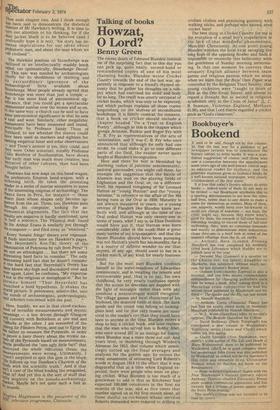Talking of books
Howzat, 0 Lord?
Benny Green
The recent death of Edmund Blunden reminds me of the surprising fact that to this day you can pick up, quite easily, second-hand or remaindered copies of one of his most charming books. Blunden wrote Cricket Country towards the end of the last war, apparently in response to a friend's rhymed entreaty that he gather his thoughts on a subject which had exercised his mind and body for so long. The result was utterly untypical of cricket books, which was only to be expected, and which perhaps explains all those copies languishing on the shelves of secondhand bookshops. It is faintly comical, for instance, that a book on cricket should include a chapter headed 'On a Trait in English Poetry ', although as this is the chapter which groups Aristotle, Ruskin and Roger Fry with C. B. Fry as representatives of the arts of ratiocination, and it was C. B. Fry who once announced that although he only had one stroke, he could make it go to nine different parts of the field, the reader never quite laughs at Blunden's incongruities.
Here and there his text is blemished by alarming rashes of patriotic sentimentality, pastoral gasconades, you might call them, for example the suggestion that the battle of Alamein was won on the playing fields of Edgbaston and the Oval; or, on a different level, his repeated eulogising of Sir Leonard Hutton as "young Hutton" and the "young batsman," in reference to the affair of the 364 boring runs at the Oval in 1938. Maturity is not always measured in years, as a young veteran of Flanders like Blunden knew perfectly well, and although at the time of the Oval ordeal Hutton was only twenty-one in terms of years, what I say is, as Eliza Doolittle would have put it, that Hutton was born considerably older in the tooth than a great many turtles of my acquaintance, and that the theme Blunden should have been pursuing was not Hutton's youth but his morality, for it is a source of infinite wonder to me that anyone, of any age, should want to bat in a cricket match, of any kind, for nearly fourteen hours.
But for the most part Blunden confines himself to the water-meadows of Edwardian reminiscence, and in recalling the remote and irrecoverable past, that is to say, his own childhood, he very nearly confesses openly that the scenes he describes are dappled with the light of nostalgia rather than with any sunshine a meteorologist would recognise. The village games and local characters of his boyhood, the deserted fields at dusk, the dank ponds and the cream teas belong to lookingglass land, and for that very reason are more vivid to the reader's eye than they could have been to anyone at the time. Blunden enters a shop to buy a cricket book, and later realises that the man who served him is Bobby Abel, who once scored 357 in an innings for Surrey when Blunden was a mere three not out. And years later, in thumbing through Wisden's Almanac for 1915, that volume which unwittingly totted up the final averages and analyses for the golden age, he enjoys the ironic amusement of savouring Lord Roberts's words in August 1914 to the effect that it was disgraceful that at atime when England expected, there were people who went on playing cricket. What Blunden is too much of a gentleman to add is that as Kitchener had expected 100,000 volunteers in the first six months of the war, and as five times that number signed on in the first month alone, all those dutiful ex-cricketers whose services Roberts demanded were reduced to drilling in civilian clothes and practicing gunnery with walking sticks, and perhaps who knows, even cricket bats?
The best thing in Cricket Country for me is the evocation of a small boy's stupefaction in the face of that wonderful phenomenon, Muscular Christianity. At one point young Blunden watches the local vicar savaging the long hops of the opposing bowler and finds it impossible to reconcile this bellicosity with the gentleness of Sunday morning sermonising. In that one moment he conveys that uniquely English alliance between team games and religious passion which we sense when we learn that the Boys' Own Paper was controlled by the Religious Tract Society, that young cricketers were "taught to think of Him as the One Great Scorer, and almost to regard a Straight Bat as second in religious symbolism only to the Cross of Jesus" (L. C. B. Seaman, Victorian England, Methuen EI.50), and that Lord Harris regarded a cricket pitch as "God's classroom".


































 Previous page
Previous page